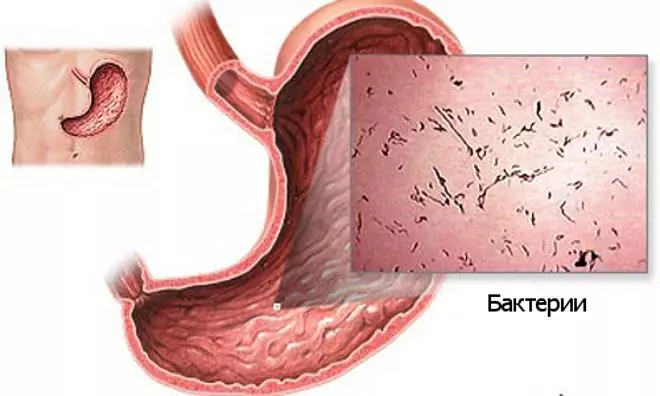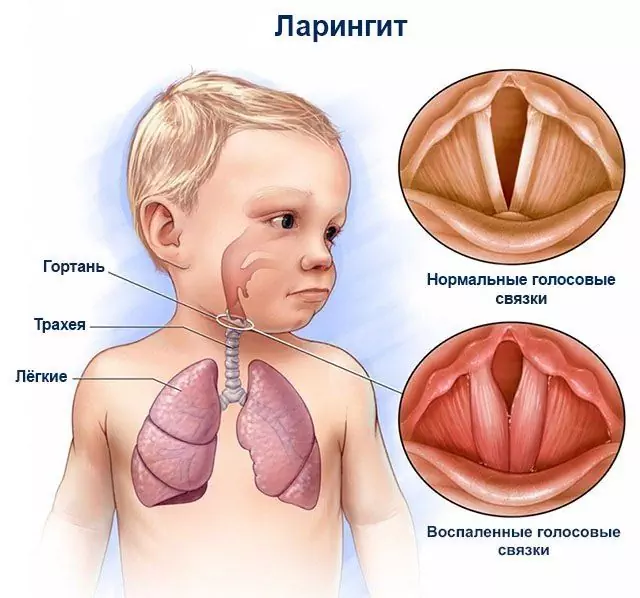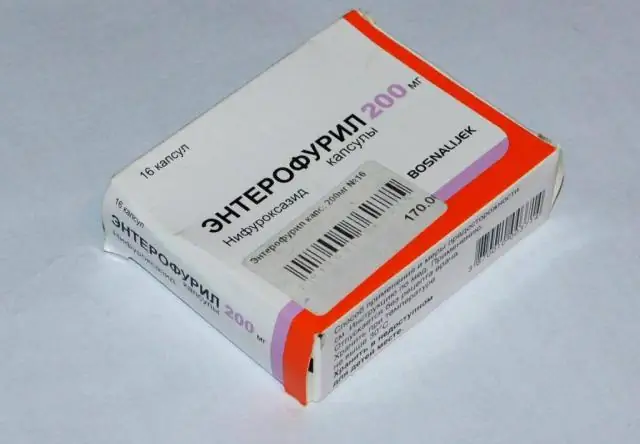- Author Rachel Wainwright wainwright@abchealthonline.com.
- Public 2023-12-15 07:39.
- Last modified 2025-11-02 20:14.
Maxicold for children
Maxikold for children: instructions for use and reviews
- 1. Release form and composition
- 2. Pharmacological properties
- 3. Indications for use
- 4. Contraindications
- 5. Method of application and dosage
- 6. Side effects
- 7. Overdose
- 8. Special instructions
- 9. Application during pregnancy and lactation
- 10. Use in childhood
- 11. In case of impaired renal function
- 12. For violations of liver function
- 13. Drug interactions
- 14. Analogs
- 15. Terms and conditions of storage
- 16. Terms of dispensing from pharmacies
- 17. Reviews
- 18. Price in pharmacies
Latin name: Maxycold for children
ATX code: M01AE01
Active ingredient: ibuprofen (ibuprofen)
Manufacturer: Pharmstandard-Leksredstva (Russia)
Description and photo update: 28.11.2018
Prices in pharmacies: from 75 rubles.
Buy

Maxicold for children is a non-steroidal anti-inflammatory drug (NSAID).
Release form and composition
Dosage form - suspension for oral administration: from light gray / light gray with a yellowish tinge to gray / gray with a yellowish tint, with a characteristic strawberry or orange odor (100, 150 or 200 g each in dark glass bottles sealed with lids first opening control or caps with first opening control and protection against opening by children; an adapter for a syringe can be located under the lid; in a cardboard box 1 bottle complete with a measuring spoon or a 10 ml dosing syringe and instructions for use of Maxicold for children).
Composition of 5 ml suspension:
- active substance: ibuprofen - 100 mg;
- auxiliary components: liquid maltitol, sodium citrate dihydrate (sodium citrate 2-water), glycerol, polysorbate-80 (tween 80), sodium saccharinate, sodium chloride, citric acid monohydrate, xanthan gum (xanthan gum), domiphene bromide, purified water, strawberry or orange flavor.
Pharmacological properties
Pharmacodynamics
Ibuprofen is a propionic acid derivative from the NSAID group. Its mechanism of action is due to the ability to indiscriminately block cyclooxygenase 1 (COX-1) and cyclooxygenase 2 (COX-2), which leads to inhibition of the synthesis of prostaglandins - mediators of inflammation, pain and hyperthermic reaction.
Maxicold for children has a fast targeted antipyretic, analgesic and anti-inflammatory effect.
The drug reversibly inhibits platelet aggregation.
Pharmacokinetics
After entering the gastrointestinal tract, ibuprofen is well absorbed. The maximum concentration (C max) reaches after 45 minutes when taken on an empty stomach, after 1.5-2.5 hours - when taken after meals.
Ibuprofen binds to plasma proteins by 90%. Slowly penetrates into the joint cavity. It is retained in the synovial fluid, where it creates concentrations higher than in plasma.
Ibuprofen is metabolized in the liver, mainly by hydroxylation and carboxylation of the isobutyl group. About 60% of the pharmacologically inactive R-form of ibuprofen is slowly transformed into the active S-form.
The substance is characterized by a two-phase elimination kinetics. The half-life is 1-2 hours. The drug is excreted mainly by the kidneys (unchanged less than 1%), as well as with bile.
Indications for use
Maxikold for children is used from 3 months of life to 12 years:
- as an antipyretic agent: acute respiratory diseases, influenza, childhood infectious diseases, post-vaccination reactions and other infectious and inflammatory diseases with increased body temperature;
- as an anesthetic: pain syndrome of mild and moderate intensity, including toothache and headache, migraine, neuralgia, sore throat and ears, pain syndrome with sprains and other types of pain.
Maxicold for children is used as a symptomatic agent; it does not affect the progression of the disease.
Contraindications
Absolute:
- active liver disease and severe liver failure;
- progressive kidney disease and severe renal failure (creatinine clearance <30 ml / min);
- confirmed hyperkalemia;
- inflammatory bowel disease in the acute phase (Crohn's disease, ulcerative colitis);
- exacerbation of peptic ulcer of the gastrointestinal tract;
- gastrointestinal bleeding;
- a history of bleeding or perforation of gastrointestinal ulcers due to the use of NSAIDs;
- intracranial hemorrhage;
- bleeding disorders (including a tendency to bleeding, prolonged bleeding time, hemorrhagic diathesis, hemophilia);
- severe heart failure, condition after coronary artery bypass grafting;
- complete or incomplete combination of bronchial asthma, recurrent nasal / paranasal sinus polyposis and intolerance to any NSAID (including acetylsalicylic acid), including a history;
- intolerance to fructose;
- pregnancy in the third trimester;
- children's age up to 3 months;
- hypersensitivity to any component of the drug, acetylsalicylic acid or any other NSAID.
Relative (Maxicold for children can only be used under medical supervision):
- presence of Helicobacter pylori infection;
- diseases of the gastrointestinal tract outside the exacerbation phase (peptic ulcer, ulcerative colitis, bleeding, Crohn's disease, etc.);
- renal failure with creatinine clearance of 30-60 ml / min;
- moderate hepatic impairment;
- severe somatic diseases;
- cerebrovascular disease, arterial hypertension, peripheral arterial disease, heart failure, fluid retention and edema, dyslipidemia / hyperlipidemia, diabetes mellitus;
- urticaria, bronchial asthma;
- blood diseases of unknown etiology (leukopenia and anemia);
- autoimmune diseases of the connective tissue (including systemic lupus erythematosus);
- simultaneous use of other NSAIDs, oral glucocorticosteroids (for example, prednisolone), antiplatelet agents (including clopidogrel), anticoagulants (including warfarin), selective serotonin reuptake inhibitors (including fluoxetine, sertraline, paroxetine, citalopram), lithium preparations antihypertensive drugs, methotrexate;
- pregnancy in the I and II trimesters;
- lactation period.
Maxikold for children, instructions for use: method and dosage
Suspension Maxikold for children is intended for oral administration. The bottle should be shaken thoroughly beforehand. For accurate dosing, it is recommended to use the supplied syringe / spoon.
When using a syringe, the following rules should be followed:
- Insert the syringe tightly into the neck of the bottle.
- Shake the suspension well.
- Turn the bottle upside down and collect the required volume of suspension by gently pulling the plunger down.
- Turn the bottle upside down and remove the syringe, gently turning it.
- Place the syringe in the child's oral cavity and, slowly pressing the plunger, smoothly release the suspension.
- Rinse the syringe with warm water and dry.
The dosage of Maxikold for children depends on age and body weight. Depending on the indications, a single dose is 5-10 mg / kg, the frequency of administration is 3-4 times a day, but not more than 30 mg / kg / day.
Recommended dosage of the suspension at elevated body temperature and pain syndrome:
- 3-6 months (body weight> 5 kg): 2.5 ml 3 times / day, maximum daily - 150 mg of ibuprofen;
- 6-12 months (body weight 6-10 kg): 2.5 ml 3-4 times / day, maximum per day - 200 mg;
- 1-3 years (10-15 kg): 5 ml 3 times / day, maximum per day - 300 mg;
- 4-6 years (15-20 kg): 7.5 ml 3 times / day, maximum per day - 450 mg;
- 7-9 years (21-29 kg): 10 ml 3 times / day, maximum per day - 600 mg;
- 10-12 years (30-40 kg): 15 ml 3 times / day, maximum per day - 900 mg.
With post-immunization fever, children under 1 year of age are prescribed a drug in a dose of 2.5 ml. Children over 1 year of age, if necessary, after 6 hours, can be given another dose of 2.5 ml. During the day, the total permitted dose of the suspension is 5 ml.
The interval between doses should not be less than 6 hours.
Duration of use of Maxikold for children:
- increased body temperature - up to 3 days;
- pain syndrome - up to 5 days.
In the absence of effect and if longer treatment is required, consultation with the attending physician is required.
Side effects
- allergic reactions: skin rashes, itching of the skin, urticaria, fever, bronchospasm, exacerbation of bronchial asthma, anaphylactoid reactions, angioedema, anaphylactic shock, toxic epidermal necrolysis (Lyell's syndrome), exudative erythema multiforme - Jones's syndrome;
- from the nervous system: insomnia, dizziness, psychomotor agitation, headache, depression; in patients with autoimmune diseases - aseptic meningitis;
- from the senses: ringing in the ears, hearing loss, visual impairment;
- from the gastrointestinal tract: ulcerative stomatitis, flatulence, diarrhea / constipation, pain or discomfort in the epigastrium, nausea, vomiting, bleeding, erosive and ulcerative lesions, exacerbation of Crohn's disease / ulcerative colitis, increased activity of hepatic transaminases, liver dysfunction, hepatitis;
- from the respiratory system: shortness of breath;
- from the side of the cardiovascular system: increased blood pressure, tachycardia, heart failure, stroke, myocardial infarction;
- from the urinary system: increased concentration of urea in the blood plasma, cystitis, impaired renal function, peripheral edema, papillary necrosis, interstitial nephritis, acute renal failure;
- on the part of the hematopoietic organs: agranulocytosis, thrombocytopenia, leukopenia, anemia, pancytopenia.
Overdose
Symptoms: tinnitus, headache, nausea, abdominal pain, vomiting, decreased blood pressure, tachycardia, bradycardia, acute renal failure, metabolic acidosis, coma.
Treatment: gastric lavage (if no more than 1 hour has passed since the drug was taken), intake of activated charcoal, abundant alkaline drink, forced diuresis, symptomatic therapy.
special instructions
The product does not contain dyes. The suspension contains no sugar, so it can be prescribed to patients with diabetes mellitus. However, it is not recommended for fructose intolerance, as it contains maltitol.
To reduce the risk of side effects, Maxicold suspension for children should be used in the minimum effective dose for a short period of time.
Long-term therapy can increase the risk of developing acute coronary disease or stroke. Long-term treatment should be carried out under the supervision of the attending physician and include monitoring of the peripheral blood picture, the functional state of the kidneys and liver.
Maxicold for children is not recommended to be taken simultaneously with drugs containing ethanol.
Ibuprofen can affect the results of the 17-ketosteroid test, so the drug should be discontinued 48 hours before the intended study.
While taking ibuprofen, bronchospasm may develop, therefore, patients who currently or have a history of an allergic disease or bronchial asthma should consult a doctor before using Maxikold for children.
Patients with autoimmune diseases of the connective tissue (including systemic lupus erythematosus) are required to consult a doctor before starting therapy, since ibuprofen increases the risk of developing aseptic meningitis.
After consultation with a doctor and with caution, Maxikold for children should be taken by patients with a history of hypertension and / or heart failure, since NSAIDs can cause fluid retention, edema and hypertension.
If any signs appear that suggest an ulcerative lesion or bleeding of the gastrointestinal tract, Maxicold for children should be immediately discontinued and a doctor should be consulted for an examination, which should include a fecal occult blood test, a complete blood count with the determination of hemoglobin and hematocrit, and esophagogastroduodenoscopy …
Particular care must be taken while taking medications that increase the risk of developing complications from the gastrointestinal tract, including glucocorticosteroids and anticoagulants (acetylsalicylic acid, warfarin, etc.).
In rare cases, while taking ibuprofen, hematopoietic disorders have been noted. You should immediately consult a doctor if you develop symptoms such as fever, severe weakness, sore throat, nosebleeds, superficial ulceration of the mouth, hemorrhagic skin rashes, flu-like symptoms.
Influence on the ability to drive vehicles and complex mechanisms
If you experience adverse reactions from the central nervous system (for example, dizziness) or visual disturbances, it is recommended to refrain from performing potentially hazardous activities, including driving a car.
Application during pregnancy and lactation
In the I and II trimesters of pregnancy, Maxicold for children can be used if the expected benefit of therapy, according to the doctor, outweighs the potential risks. In the third trimester, the drug is contraindicated.
Ibuprofen penetrates into the mother's milk in small quantities, therefore, a negative effect on the infant is unlikely. However, if it is necessary to take the drug in high doses and / or to conduct long-term therapy, it is recommended to interrupt breastfeeding during treatment.
Pediatric use
The use of Maxicold for children under 3 months is contraindicated.
With impaired renal function
- with caution: moderate renal failure (creatinine clearance 30-60 ml / min);
- contraindicated: progressive kidney disease, severe renal failure (creatinine clearance <30 ml / min).
For violations of liver function
- with caution: moderate hepatic impairment;
- contraindicated: progressive liver disease, severe liver failure.
Drug interactions
Special care is required if it is necessary to use Maxikold for children at the same time in combination with the following drugs:
- acetylsalicylic acid (ASA) and other NSAIDs: the risk of side effects increases. When ASA is prescribed to patients with ischemic heart disease or cerebrovascular accident, its effectiveness may decrease;
- antihypertensive drugs, including angiotensin-converting enzyme (ACE) inhibitors and slow calcium channel blockers: their effect decreases;
- corticosteroids, selective serotonin reuptake inhibitors (including fluoxetine, sertraline, paroxetine, citalopram): the risk of gastrointestinal bleeding increases;
- some antacids: decreased absorption of ibuprofen;
- cardiac glycosides: their level in the blood plasma may increase, heart failure may increase, the glomerular filtration rate may decrease;
- drugs that block tubular secretion: the excretion of ibuprofen decreases, and its plasma concentration increases;
- myelotoxic drugs: manifestations of ibuprofen hematotoxicity increase;
- uricosuric drugs, thiazide diuretics: their effectiveness decreases;
- thrombolytic drugs, fibrinolytics, antiplatelet agents: their effect is enhanced;
- inducers of microsomal oxidation (including phenylbutazone, barbiturates, rifampicin, tricyclic antidepressants, phenytoin, ethanol): the production of hydroxylated active metabolites increases, which increases the risk of developing severe hepatotoxic reactions;
- inhibitors of microsomal oxidation: the risk of developing ibuprofen hepatotoxicity is reduced;
- quinolone antibiotics: the risk of seizures increases;
- tacrolimus: increased risk of nephrotoxicity;
- cefamandol, cefotetan, cefoperazone, plikamycin, valproic acid: the incidence of hypoprothrombinemia increases;
- lithium: its excretion slows down;
- cholestyramine: absorption of ibuprofen decreases;
- mifepristone: its effectiveness decreases (if necessary, ibuprofen can be taken no earlier than 8-12 days after discontinuation of mifepristone);
- caffeine: the analgesic effect of ibuprofen is enhanced;
- cyclosporine and gold preparations: the effect of ibuprofen on the synthesis of prostaglandins in the kidneys increases, which increases the risk of nephrotoxicity;
- mineralocorticosteroids, glucocorticosteroids: their side effects increase;
- zidovudine: an increase in hematotoxicity is possible; there is evidence of an increased risk of hematomas and hemarthrosis in HIV-positive patients with hemophilia;
- methotrexate: its excretion slows down; with impaired renal function, the risk of developing hepatotoxic reactions is significantly increased, even with the use of methotrexate in low doses (less than 20 mg per week).
Analogs
Analogues of Maxikold for children are: Brudol for children, Advil, Deblok, Brufen SR, Ibuprofen, Ibuprofen for children, Advil for children, MIG 400, Ibuprofen Sandoz, Nurofen, Ibuprofen-Hemofarm, Bonifen, MIG for babies, MIG for children, Nurofen for children, Solpaflex, Faspik, etc.
Terms and conditions of storage
Store out of the reach of children at temperatures up to 25 ° C.
Shelf life is 2 years.
Terms of dispensing from pharmacies
Available without a prescription.
Reviews about Maxikold for children
Parents leave mostly only positive reviews about Maxikold for children: the drug quickly and effectively reduces fever and relieves pain. Additional advantages include the absence of colorants in the composition, pleasant taste of the suspension and low cost compared to most preparations of a similar composition. Many people say that it is much more convenient to use packaging with a measuring syringe than with a spoon.
Price for Maxicold for children in pharmacies
On average, the price of Maxikold for children is 145-165 rubles per bottle of 200 g.
Maxicold for children: prices in online pharmacies
|
Drug name Price Pharmacy |
|
Maxicold for children 100 mg / 5 ml suspension for oral administration with orange flavor 200 g 1 pc. RUB 75 Buy |
|
Maxicold for children 100 mg / 5 ml suspension for oral administration with strawberry flavor 200 g 1 pc. RUB 128 Buy |
|
Maxikold for children suspension. for internal approx. strawberry 100mg / 5ml 200ml RUB 186 Buy |
|
Maxikold for children suspension. for internal approx. orange 100mg / 5ml 200ml RUB 186 Buy |

Maria Kulkes Medical journalist About the author
Education: First Moscow State Medical University named after I. M. Sechenov, specialty "General Medicine".
Information about the drug is generalized, provided for informational purposes only and does not replace the official instructions. Self-medication is hazardous to health!






